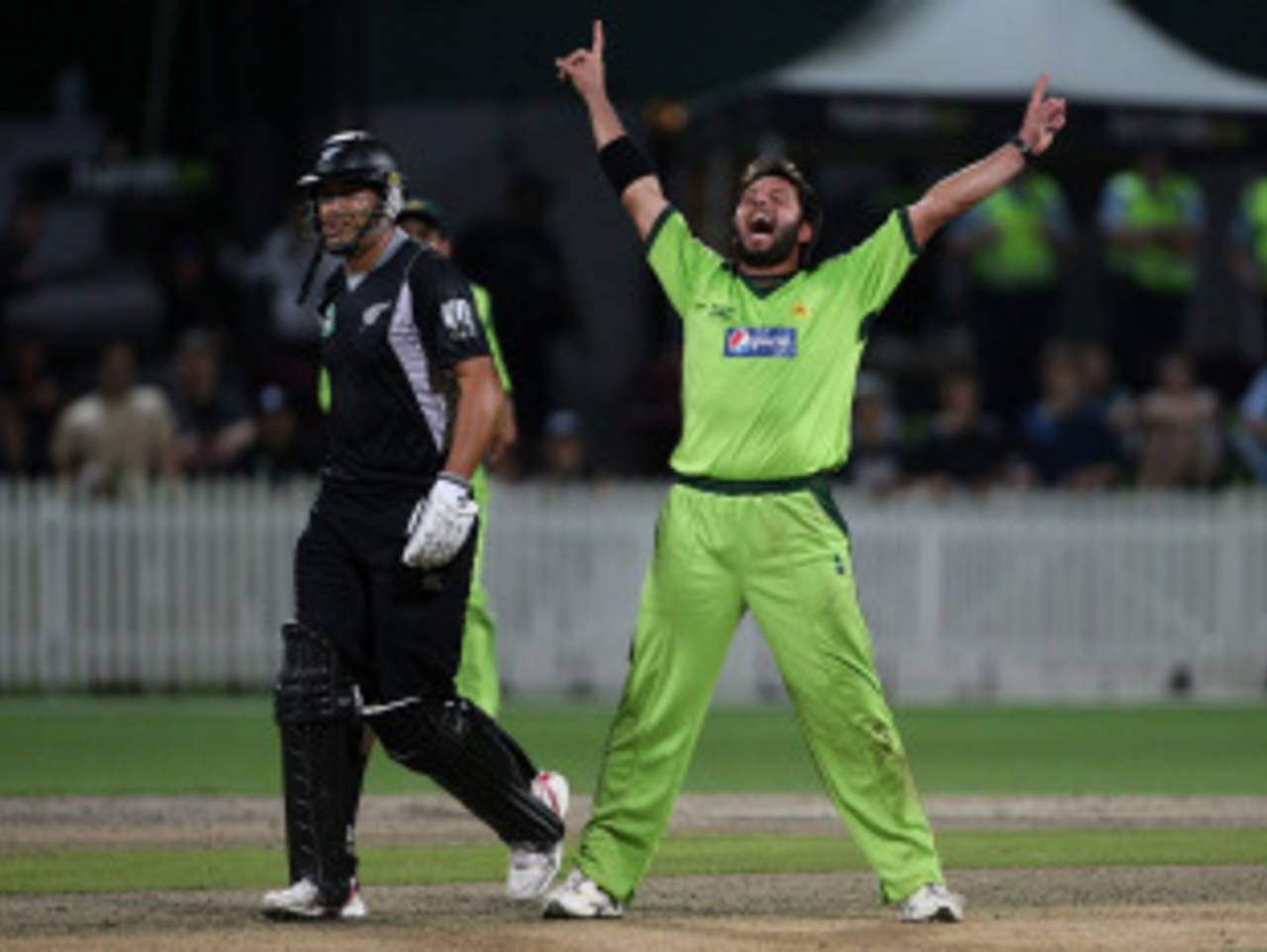In praise of low expectations
In the tournament's early years, Pakistan cricket fans viewed the World Cup with fascination but reasonable expectations
Kamran Abbasi
25-Feb-2013

Shahid Afridi can dazzle with the ball and destroy with the bat • Getty Images
In the tournament's early years, Pakistan cricket fans viewed the World Cup with fascination but reasonable expectations. Defeat in a semi-final was a minor triumph, as anybody but the West Indies winning the trophy was unimaginable. Those carefree days were banished by two related events. First, India's shock success in 1983 gave everybody else hope and an insight into the unpredictability of limited-overs cricket. Thanks to India's achievement, as well as much political intrigue, the right to host the 1987 World Cup was awarded to India and Pakistan.
When India and Pakistan lined up for their respective semi-finals, on home territory, low expectations had metamorphosed into expectant hysteria. The pressure was too much as co-hosts and co-favourites were defeated by unfancied teams from Australia and England; the cricket world's upstarts put in their place by the founding nations.
The scars of those defeats burned long and deep, especially in Pakistan. India had already bagged their World Cup trophy. Pakistan had become perennial semi-finalists, mere onlookers. Happily, Pakistan quickly satisfied their desires with the iconic victory of 1992, but the disease of expectant hysteria had taken hold, reaching fever pitch at roughly four-year intervals.
Indeed, a thrilling quarter-final loss to India in 1996 followed by a gut-wrenching defeat in the 1999 final only served to intensify the illness, with expectant hysteria resurfacing in the World Cups of 2003 and 2007 despite hard evidence of a decline in Pakistan cricket and its cricketers.
I guess it would be still with us had it not been for the utter demoralisation of many Pakistan fans by the spot-fixing saga. With Mohammad Amir and Mohammad Asif in our ranks, we would be imagining that our bowling attack could storm the tournament. We would put our faith in the two Mohammads and the reverse-swing of Umar Gul to compensate for any deficiencies in fielding and batting.
Instead, the reality check is that the bowling attack is decent but unspectacular. Gul remains, and is supported by a fading Shoaib Akhtar and a bouncy, inexperienced Wahab Riaz. Shahid Afridi might still dazzle but Abdul Razzaq and Mohammad Hafeez are more prosaic bowling talents.
Expectant hysteria has burned itself out. Instead we wait for the next blow to the ribs in the shape of unpredictable calamity. But does that mean I am shorn of hope? Far from it. Great bowling attacks might win you a World Cup in England or Australia but not necessarily in the subcontinent. And when it comes to it, Pakistan have enough firepower and sufficient familiarity with the conditions to pose a threat. The batsmen might not send shivers down the spines of the opposition but they can thrive in these conditions, especially with the lower order ballistics of Afridi and Razzaq.
More importantly, Pakistan are wounded; Shoaib has said as much, and that is when they are most dangerous. And, in truth, other than the loss of Amir, they are not especially weakened. The players have a point to prove and a reputation to restore. The wayward influences have been expelled, we hope, and the team has pulled together in recent months, rewarded for old-fashioned virtues of determination and unity. Playing away from the pressure of frenzied home crowds might be of additional benefit, as will finding themselves in the weaker half of the first-round draw.
With Australia less dominant now than they were in the preceding decade, this is an open World Cup with much expectation centred on the prospect of a new World Cup winner being crowned after 12 years of Aussie rule. Australia might still confound us all, but any of the top eight cricket nations could lift the trophy. The format of the tournament will ease the passage of the big powers to the knockout stages, where anything could happen, even a Pakistan victory.
On form, India might well be favourites but they will have to contend with the debilitating effects of expectant hysteria. Pakistan have no such worries. The world of low expectations is a relaxing place to be except that teams with low expectations, in their differing ways, won every World Cup from 1983 to 1999.
The step from low expectations to expectant hysteria is conceptually gargantuan but, in the distorted reality of a sports fan, it is frighteningly short and easily goaded. My advice is to resist that perilous journey for as long as humanly possible, in essence the quarter-finals stage of World Cup 2011: March 23, or Pakistan Day, to be precise.
Kamran Abbasi is an editor, writer and broadcaster. He tweets here